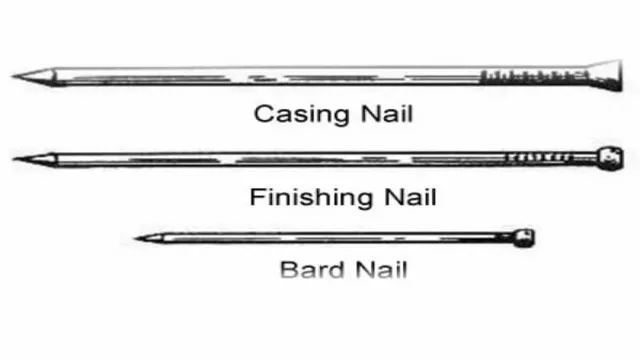What Size Nails for Door Casing: A Comprehensive Guide for DIYers

Are you planning to install a new door casing, but unsure which nails to use? Choosing the right nails is essential to ensure the door casing is securely and firmly installed. The right nails prevent the door from wobbling or shifting, keeping it in place for years to come. With so many different nail types and sizes available, making the right choice can be overwhelming.
You might be wondering which nails are best for your specific door casing, or what size and length will provide the necessary support. But don’t worry, we’re here to help! In this blog post, we’ll provide you with all the information you need to choose the right nails for your door casing. From understanding different nail types and lengths to determining the right size and material, we’ll guide you through the process step-by-step.
So, let’s get started!
Why Nail Size Matters
When it comes to installing door casing, selecting the right size nails is crucial in ensuring a secure and long-lasting attachment. The most common nail sizes for interior trim are 15 or 16 gauge with a length of 1 1/2 to 2 1/2 inches. The length of the nail is especially important, as it should penetrate through the casing and into the framing at least 1 1/2 inches.
Using a nail that is too short can cause the casing to loosen over time and create an unsightly gap between the trim and the wall. On the other hand, using nails that are too long can cause the casing to crack or split, which can affect the overall appearance of the door. In addition to size, it’s important to consider the type of material you’re nailing into, as well as any potential interference with nearby electrical or plumbing lines.
Taking the time to carefully select the appropriate nail size for your door casing installation will ultimately save you time and money down the line.
Ensures Door Stability
When it comes to ensuring the stability of your doors, the nail size you use can make all the difference. Choosing the right size nail can help prevent your door from sagging or even falling off its hinges. But first, let’s go over the basics.
A nail that is too short won’t be able to hold the weight of the door, while a nail that’s too long can cause the wood to split. In general, the ideal nail size for a door hinge is about an inch and a half long. Using smaller or larger nails can lead to instability over time.
It’s important to remember that something as seemingly small as the nail size can have a significant impact on the durability and longevity of your doors. So, take the time to choose the right nail size and ensure your doors are as stable as possible.

Prevents Splitting
When it comes to nails, size matters – especially if you’re trying to prevent splitting. Using the right size nail can mean the difference between a smooth, sturdy installation and one that’s prone to cracking and warping over time. The reason is simple: a nail that’s too large can put too much pressure on the wood, causing it to split apart and weaken.
On the other hand, a nail that’s too small may not have enough grip to hold the wood securely in place. The key is to strike a balance between size and strength, and to choose a nail that matches the thickness and density of your wood. By doing so, you’ll ensure a tight, long-lasting fit that won’t let you down over time.
So next time you’re tackling a wood project, take the time to consider your nail size carefully – your results will be sure to thank you!
Impact on Appearance
When it comes to nail size, many people don’t think much about it. But did you know that the size of your nails can actually impact your appearance? Think about it – if your nails are too short, it can make your fingers look stubby and unpolished. On the other hand, if your nails are too long, it can look like you’re trying too hard and can even be impractical.
So, what’s the sweet spot when it comes to nail length? That depends on personal preference and lifestyle, but typically, the ideal nail length is about a quarter-inch beyond your fingertip. This length allows for a clean and polished look without being too over-the-top. It’s important to find the right nail size for you – after all, your hands and nails are a reflection of you and your personality.
So don’t be afraid to experiment and find what works best for you!
Factors to Consider When Choosing Nail Size
When it comes to choosing the right nail size for your door casing, there are a few factors that you need to consider. The first thing to think about is the thickness of the molding that you’re working with. A thinner molding will require a smaller size nail, while a thicker molding will require a larger one.
The next thing to think about is the type of material you’re working with. If you’re working with a softer wood, you’ll want to use a smaller nail to prevent the wood from splitting. On the other hand, if you’re working with a harder material, such as metal or hardwoods, you’ll need to use a larger nail to ensure that it holds securely.
Lastly, think about the size and weight of the door itself. Heavier doors will require a stronger and longer nail to ensure that they stay in place over time. By taking these factors into consideration, you can choose the right size nail for your door casing that will provide the strength and hold that you need.
And remember, if you’re ever unsure which nail size to use, consult a professional for expert advice.
Door Casing Material
When it comes to choosing nail size for your door casing material, there are a few factors to consider. First and foremost, you want to make sure that the nail is long enough to securely attach the casing to the wall or doorframe. A good rule of thumb is to use a nail that is at least
5 times the thickness of the casing material. Additionally, you want to make sure that the nail head is not too big or too small for the size of the casing material. If the nail head is too small, it may not provide sufficient holding power, while a nail head that is too big may be unsightly and difficult to cover with paint or wood filler.
Finally, if you are using a pneumatic nail gun, you will need to choose a nail that is compatible with your tool and equipment. By taking these factors into account, you can ensure that your door casing is securely attached and looks great for years to come.
Length of Nail
When it comes to choosing the right nail size for your project, the length of the nail is an important factor to consider. The length of the nail will depend on the thickness of the material you are working with. If the material is thin, a shorter nail will suffice, but if it’s thicker, a longer nail will be necessary to secure it properly.
You also need to take into account the type of wood or material you are using, as different materials require different lengths of nails. Using a nail that is too short for the material can result in the nail not holding and causing the project to fail. On the other hand, using a nail that is too long can cause the material to split or crack, resulting in an even bigger problem.
Therefore, it’s crucial to choose the right length of nail to ensure a successful and sturdy outcome.
Thickness of Door Casing
When it comes to door casing, the thickness should be taken into consideration as it affects the method and size of fasteners needed for installation. The most common thicknesses are 5/8 inch and 3/4 inch, but it ultimately depends on the material used. For example, if the door is made of a dense material like oak, a thicker casing would be necessary for added support.
When choosing nail size for door casing installation, the thickness of the casing and material should be taken into account. If the nail is too short, it won’t penetrate the casing and hold it securely, but if it’s too long, it may pierce through to the other side of the jamb. As a general rule of thumb, nails should be three times longer than the thickness of the material being attached.
For a 3/4 inch casing, a 2 1/2 inch nail would be appropriate, but for a thicker casing like 7/8 inch, a 3 inch nail may be a better choice for secure installation. It’s crucial to choose the right nail size to ensure the door casing is securely in place for longevity.
Recommended Nail Sizes for Door Casing
When it comes to installing door casings, knowing what size nails to use is crucial for ensuring a sturdy and secure fit. The most common nail sizes for door casings range from 5 inches to 3 inches in length and 15 to 16 gauge in diameter.
However, it’s important to take into account the thickness and material of the casing you’re working with. Thicker and denser material may require longer or thicker nails to penetrate and hold in place properly. Additionally, using the right type of nail, such as finishing or casing nails, can also make a significant difference in the overall strength and stability of the installation.
So, before you start hammering away, be sure to carefully consider the size and material of your door casing and choose the appropriate nails to ensure a job well done.
For Thin Door Casings (up to 5/8 inch)
When it comes to installing door casings, choosing the right nail size is crucial. For thin door casings that are up to 5/8 inch thick, it’s essential to use the right type of nail to prevent any splitting or damage to the wood. For this type of casing, we recommend using 1 ¼ inch or 1 ½ inch nails that are 16-gauge.
These nails are strong enough to hold the casing in place without causing any damage to the wood. It’s important to make sure that the nails are long enough to reach the framing behind the door jamb without going through it. This will ensure that the casing is securely mounted and won’t come loose over time.
Always use nails that are specifically designed for finish carpentry, as they are less likely to split the wood and will provide a smoother finish. By using the right nail size for your thin door casing, you can ensure a secure and visually appealing finish that will last for years to come.
For Average Door Casings (between 5/8 to 7/8 inch)
When it comes to installing door casings, using the correct nail size is crucial for ensuring a secure and stable installation. For average door casings that range from 5/8 to 7/8 inches in thickness, there are several recommended nail sizes to consider. One popular option is a 1 1/2 inch finishing nail, which is ideal for attaching the casing to the door frame.
These nails are thin enough to prevent splitting and damage to the wood, but long enough to provide a strong hold. Another option is a 2 inch brad or finishing nail, which is slightly longer than the 1 1/2 inch nail and can be used for a more heavy-duty installation. These nails are also thin enough to prevent splitting, but strong enough to keep the casing securely in place.
Ultimately, the best nail size for your door casing will depend on the specific thickness and material of your casing, as well as the tools you have available for installation. Always take care to choose a nail size that is appropriate for your project to ensure a smooth and successful installation. So, before you start installing your door casing, make sure to choose the right nail size for the job.
By doing so, you can ensure that your casing stays securely in place for years to come.
For Thick Door Casings (over 7/8 inch)
When it comes to installing door casing on thick door frames that are over 7/8 inch in depth, it’s important to use nails that are sturdy enough to keep the casing in place. For these types of installations, it’s recommended to use 16-gauge or 15-gauge finishing nails that are at least 2 inches long. These thicker nails can withstand the pressure needed to attach the casing to the frame securely.
Additionally, it’s best to use a nail gun with enough power to shoot the nails into the dense wood of the frame without causing any damage. With the right nails and equipment, installing door casing on thick door frames can be a breeze. So, don’t settle for flimsy nails and risk a shaky installation.
Opt for thick finishing nails that can handle the job effectively.
Final Thoughts and Recommendations
When it comes to choosing the right size nails for your door casing, it’s important to consider the thickness of the casing itself. In general, a 2 1/2 inch nail is a good choice for most door casings, as it provides ample support and won’t be too long or too short. However, if your casing is thicker or thinner than average, you may need to adjust the size accordingly.
It’s also important to choose the right type of nail, such as a finishing nail or brad nail, depending on the material of your casing. Ultimately, the best way to ensure you’re using the right size nails is to consult with a professional or reference a reliable guide to carpentry. By taking the time to do your research and choose the right nails, you can ensure that your door casing is secure and properly installed for years to come.
Conclusion
In the immortal words of Goldilocks, when it comes to choosing the right size nails for your door casing, you want them to be just right. Nails that are too small won’t hold up the weight of the door, while nails that are too big could split the wood. So, what’s the perfect size? It all depends on the thickness of the casing and the weight of the door.
In other words, you’ll need to do a little bit of math and some trial and error to find the perfect fit. But with a little perseverance, you’ll be sure to nail it every time.”
FAQs
What length nails should I use for door casing installation?
It is recommended to use 2 to 2 ½ inch nails for door casing installation.
Can I use finish nails for door casing installation?
Yes, you can use finish nails for door casing installation, but it is recommended to use casing nails for better hold and stability.
What gauge nails should I use for door casing?
For door casing, it is recommended to use 15 or 16 gauge nails for better holding strength.
Can I use a nail gun for door casing installation?
Yes, you can use a nail gun for door casing installation. It provides faster installation and better holding strength.
Should I use coated or uncoated nails for door casing?
It is recommended to use the coated nails for door casing. The coating adds extra protection against corrosion and rust.
How many nails should I use per foot of door casing?
It is recommended to use 2 to 3 nails per foot of door casing for better holding strength.
Is it necessary to pre-drill the holes before nailing door casing?
No, pre-drilling is not necessary for nailing door casing. But pre-drilling can prevent splitting or cracking of the wood.







